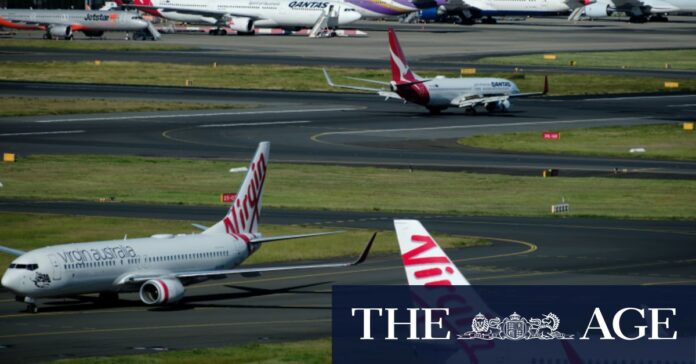[ad_1]
Airfares may be falling, but the number of delayed and cancelled flights in Australia remains well above the long-term average, the consumer watchdog has found.
The Australian Competition and Consumer Commission (ACCC) on Tuesday issued its first report on domestic airline competition since its quarterly monitoring was reinstated at the end of last year.
It found the airlines’ average revenue per passenger— a key indicator of ticket prices– was 13 per cent lower in December 2023 than in December 2022 when adjusted for inflation. But with the cost of airfares over the month just 1 per cent lower than prices before the pandemic, the service provided by the airlines was well below average.

The ACCC says airfares have fallen, but airline service remains below standard.Credit: Oscar Colman
ACCC boss Gina Cass-Gottlieb said the airfare relief was welcome, but customers had been let down by reliability issues. “The persistently high rates of cancellations and delays compared to long-term averages in the second half of last year were clearly disappointing for consumers,” she said.
While overall ticket prices have come down a notch, it’s still hard to find bargains. The “best discount” economy airfares are still above pre-pandemic levels, with the real price index of discount airfares 5 per cent higher this January than in January 2020, the competition watchdog found.
The government reinstated the ACCC’s monitoring in October, now to run until 2026, following fierce criticism the air travel sector was improperly regulated and uncompetitive. Qantas was the only airline to oppose the resumption of the monitoring reports, arguing that the ACCC already oversees the industry.
The ACCC said in its report that although volatility in capacity had subsided, the number of delays and cancellations remained well above pre-COVID-19 levels. The percentage of flight cancellations has consistently been above the long-term average of 2 per cent, and about 35 per cent of flights were delayed in December, well above the long-term average of 19 per cent.
Bonza cancelled almost 20 per cent of flights in December, followed by Virgin at 8 per cent. Jetstar cancelled 6 per cent while Qantas cancelled 4 per cent. Rex recorded the lowest cancellation rate over the month, at 1 per cent.
“Factors contributing to poor service reliability and within airlines’ control include efforts to manage systemic issues associated with the COVID-19 pandemic, pilot shortages, pilot training bottlenecks and some supply chain disruptions,” the ACCC said. It also noted ongoing staffing issues within Airservices Australia – the government body responsible for air safety – had also contributed to poor service levels.
[ad_2]
Source link


